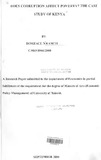| dc.contributor.author | Kamiti, Boniface N | |
| dc.date.accessioned | 2013-04-26T10:03:52Z | |
| dc.date.available | 2013-04-26T10:03:52Z | |
| dc.date.issued | 2004-09 | |
| dc.identifier.uri | http://erepository.uonbi.ac.ke:8080/xmlui/handle/123456789/17029 | |
| dc.description.abstract | Corruption is increasingly viewed as a major impediment to sustained economic development
in Sub-Saharan Africa. Its importance is reflected in conditionalities for development
assistance being proposed by members of the international donor community notably World
Bank as it is recognized that corruption negatively affects poverty .
This dissertation demonstrates that high 'and rising corruption increases poverty by reducing
economic growth, the level and effectiveness of social spending and the formation of human
capital and by perpetuating an unequal access to education.
The objective of this dissertation is to investigate the relationship between corruption and
poverty. Chapter One gives the background information to the problem of corruption in
Kenya, the problem statement and the justification of the study. The research methodology
and the results and discussions are covered in Chapter three and four respectively. Chapter
five gives comprehensive conclusions, recommendations and suggestions for further studies. | en |
| dc.description.sponsorship | University of Nairobi | en |
| dc.language.iso | en | en |
| dc.subject | Corruption | en |
| dc.subject | Poverty | en |
| dc.subject | Kenya | en |
| dc.subject | Economic development | en |
| dc.title | Does corruption affect poverty? | en |
| dc.title.alternative | The case study of Kenya | en |
| dc.type | Thesis | en |
| local.publisher | Department of Economics, University of Nairobi | en |

